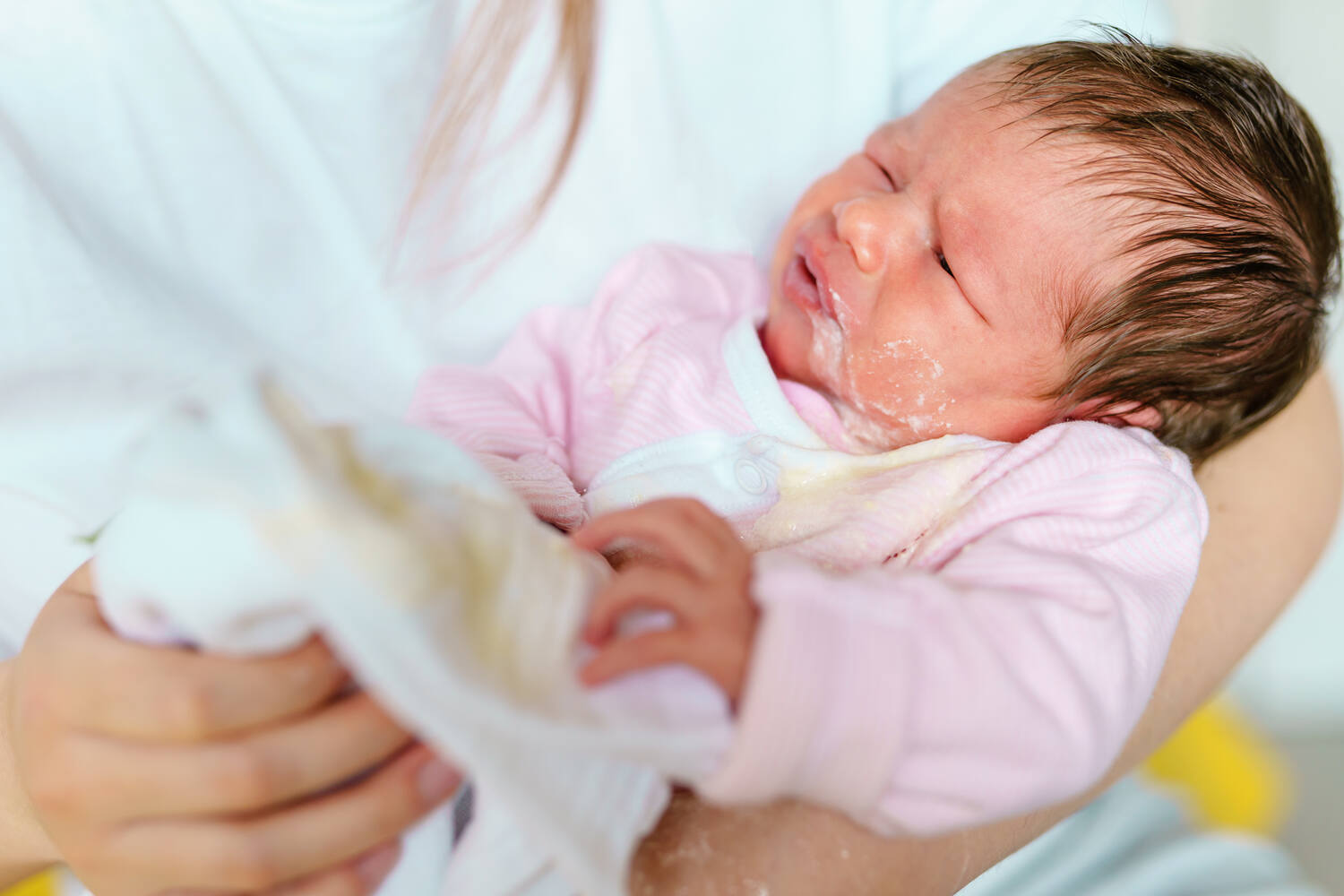
Vomiting in Babies – Causes, Symptoms, And Treatment
6 min readWritten by Gunjan Bedi


Vomiting in babies is usually short-lived and may have underlying causes such as gastroenteritis or a viral infection. Sometimes babies spit up thick milk right after feeding, which is common. It is important for mothers and caregivers to differentiate between vomiting, which needs immediate care and attention with babies’ milk spitting, which is much more common.
In many cases, babies do vomit due to indigestion. which stops within a few hours. But if the vomiting doesn’t stop, it may lead to dehydration, which may be risky for an infant’s life. In case your baby’s vomiting lasts longer, then be sure to take your infant to the pediatrician to get the necessary guidance. We’ll discuss vomiting in babies, its causes, signs and symptoms, and possible treatment in the post. So, next time you notice such things in your babies, you’ll be able to take immediate steps to protect your little one.
In This Article
- Why do Babies Vomit?
- Is it Normal For a Baby to Vomit After Feeding?
- Can You Prevent Your Baby From Vomiting?
- Home Remedies For Vomiting in Babies
- What Are the Treatment Options For Vomiting in Babies?
- When Should You Call the Doctor?
- FAQ’s
Why do Babies Vomit?
Vomiting in babies can happen due to multiple reasons ranging from inability to digest to more severe infections due to bacteria and viruses. Mild cases of vomiting can be taken care of at home while severe cases need medical intervention.
Some of the reasons why a baby may vomit include
- Indigestion
- Acid reflux
- Stomach infection
- Gastroenteritis
- Ear infection
- Formula not suiting (especially if your baby is recently introduced and starts vomiting suddenly)
- Cold
- Difficulty with feeding
- Food/milk allergies
So, how to differentiate between spit up and actual vomiting? Spit-up happens before the baby burps after a feed and happens in the form of a cheesy whitish drool and may resemble curdled milk. Vomiting, on the other hand, happens like it would happen in adults, like a projectile throw up.
Is it Normal For a Baby to Vomit After Feeding?

It is quite common for a baby to vomit after feeding, especially with newborn babies. Such spit up happens because the baby’s sphincter muscles between the esophagus and stomach are not strong as a mature baby. Moreover, overfeeding and not burping after feeding are some of the common reasons why babies do vomit.
This stops as the baby starts growing. But if they continually vomit after feeding, it can be a serious cause of concern. You can consult with your doctor to get the right treatment for the issue.
Can You Prevent Your Baby From Vomiting?
It may not always be possible to prevent your baby vomiting, especially in case of a stomach infection. On the other hand, you can keep them safe and comfortable by following a few precautions. In order to prevent your baby vomiting, you may need to understand the underlying cause for which a doctor’s advice will be needed.
A few steps you can take to prevent further vomiting and avoid dehydration include
- Stop feeding when they have been vomiting continuously. In the case of older babies, do not give your baby solid food because it will upset the stomach and aggravate the problem.
- Offer them liquid continually to avoid dehydration. You can also give the ORS solution (Oral Electrolyte Solution) every 15-10 minutes after taking guidance from your pediatrician. This helps to prevent dehydration.
- The steps to be taken also depend on the severity of the vomiting. If your baby has vomited about 3 to 4 times in a whole day, you can wait and watch while making sure that they stay hydrated.
If your baby is vomiting due to acid reflux, you can prevent this by taking a few precautions.
- Give your baby small frequent feeds.
- Make sure to burp them after feeding, especially in the case of newborn or very young babies.
- In the case of babies who are able to sit up, make them sit for some time after the feed.
If your baby has started vomiting after a recent introduction of formula feed, you can either stop giving formula for some time and reintroduce or switch to another brand.
[Read : Do You Have To Burp A Baby After Breastfeeding?]
Home Remedies For Vomiting in Babies

When your baby vomits, do ensue to increase fluid intake to avoid dehydration. In addition to this, you can give various home remedies to treat the baby’s vomiting. But remember that these remedies may not be safe for newborns and babies less than six months old. In such cases, talk to your pediatrician before trying them out. Some of the best remedies are as follows
1. Ginger And Honey Mix
Ginger is always helpful in controlling vomiting and nausea. You can grind some pieces of ginger to get the juice. Add honey into the ginger juice and give it to your kids twice or thrice a day. It would help to prevent vomiting faster.
2. Rice Water
If your baby is vomiting due to gastritis, rice water is a great remedy. You can add a pinch of salt and give it to your kids twice or four times a day. Sooner, they get relief from the problem.
[Read : 5 Amazing Health Benefits Of Rice Water For Babies]
3. Mint Juice
Mint leaves are known for improving digestion and preventing vomiting issues. If your baby is constantly vomiting, give them some mint juice by adding lemon juice to it. You can also add honey to enhance the taste. This is best for treating vomiting in kids.
4. Cloves
Cloves are usually present in Indian kitchens. If your kid (2-4 years old) has a vomiting problem, give them some cloves for chewing. It may have a pungent taste but helps control vomiting.
5. Fennel Seeds
Fennel seeds are best known to improve digestion and treat acidity problems in kids. The seeds have antibacterial properties, which help to kill bacteria and viruses, causing digestion issues. Indigestion is also a reason for vomiting.
If your child has a vomiting problem, boil some fennel seeds in water for ten minutes. Strain them and give them to drink three to four times a day. This helps to prevent vomiting.
[Read : Fennel Seeds For Babies]
6. Ginger and Onion Juice Mix
Onion and ginger are both known for their anti-bacterial properties. This mix given multiple times a day will help relieve nausea and vomiting. This helps to get relief from the vomiting faster.
What Are the Treatment Options For Vomiting in Babies?
Treatment options will depend on the underlying cause for the vomiting.
- In case of an infection, medicines such as antibiotics may be needed. For acid reflux, relevant feeding and burping measures may help reduce vomiting.
- Giving ORS solution two to three times a day helps to maintain electrolyte balance. Moreover, it helps in preventing vomiting.
- Rice water is also safe for babies suffering from vomiting.
- For food and milk allergies, stopping and restarting after some time may help control vomiting.
- Take your baby to the pediatrician if vomiting doesn’t control within 24 hours.
When Should You Call the Doctor?

While home remedies are a good way to control the severity of your baby’s throwing up, it is always safe to take your child to the pediatrician, especially in the following conditions.
- Your little one is vomiting severely for more than 5 times a day.
- Vomiting is accompanied by other symptoms such as fever and reducing to eat.
- Your baby is not active and is dull and listless or cranky.
- The baby is throwing up whatever is given and is not able to retain milk to solids.
- Your baby is showing symptoms of extreme dehydration.
Timely intervention is vital to ensure that your baby doesn’t get seriously ill.
Vomiting in babies may be common and home remedies help treat them in most cases. That being said, it is important to see a doctor when the situation gets out of control.
FAQ’s
1. What Medicine Can Stop Vomiting?
Ondansetron and solutions like Pedialyte and ORS are best to stop vomiting in kids. However, do not give any medicine without a doctor’s consultation. It can be dangerous for the baby’s health.
2. Can Overfeeding Cause Vomiting in Babies?
Yes, overfeeding can be a reason for vomiting in babies. Their stomachs are small and don’t have enough strength to digest heavy food or overfeed. As a result of this, food expels out from the mouth.
3. What is The Difference Between Spit-Up And Vomit?
Spitting up refers to the easy flow back of the stomach content from the mouth of babies. It is generally in thick curdy form and comes out as a drool. In comparison, vomit has more clear digestive juices along with stomach content and comes out like a projectile.
Read Also: GERD and Reflux in Babies – Causes, Symptoms & Treatment by Dr. Srikanta J T

Gunjan Bedi,B.Sc (Biotechnology), M.Sc (Microbiology)
Gunjan Bedi an inspirational writer and story teller. My background in medical science make me a perfect content writer in parenting and medical content writing niche. My content has touched millions of readers within three years. Since past three years I have worked with several clients in different niche and provide easy to read content that readers love the most.Read more.
Responses (0)
Want curated content sharply tailored for your exact stage of parenting?
Related articles

Top 9 Best Black and White Books For Newborn Babies
11 Month Baby Food – What to Give, What Not to Give And Sample Schedule

Room Sharing With Your Baby – Top Tips to Help Parents

Water Intoxication in Babies – What is it, Causes and Tips to Prevent

Hazelnuts For Babies – when to Introduce, Benefits & Side Effects

Baby Spitting Up Mucus – Is it Normal?
Sponsored content
Discover great local businesses around you for your kids.
Get regular updates, great recommendations and other right stuff at the right time.





